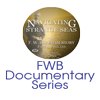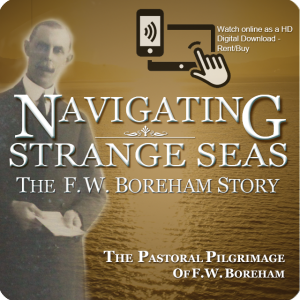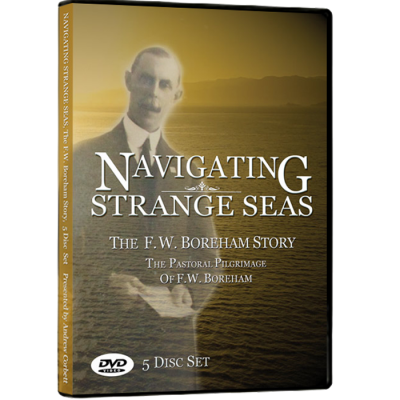Chapter IX
Unspeakable!
I
‘A PARABLE, isn’t it?’ observed John Broadbanks, cryptically, after silently surveying for some minutes the picturesque panorama spread out at our feet.
‘I suppose it is,’ I hesitantly replied, ‘for that matter, most things are. But what have you on your mind?’
John and Lilian had brought their little family to share our holiday with us at Taieri Mouth. On a lovely Sunday evening, whilst our wives were putting the children to bed, we had strolled out to the edge of the cliff, and, sprawling on the grass, were looking down on the swirl of waters in the estuary below.
The mouth of the river is partly blocked by a huge rocky island, rich in Maori legend and tradition, standing full in the sweep of the swiftly-flowing current. The presence of this formidable obstruction compels the waters surging in or out of the gorge force themselves through one or other of the narrow channels on either side. They manage this feat with propriety and tranquillity save only when the tide is actually on the turn. At such moments the scene resembles the confusion at the entrance to a public building when one unruly crowd is fighting frantically to get in whilst another is desperately struggling to get out.
It chanced that the tide was actually turning whilst we rested near the brink of the precipice. As the moon rose, transforming the expanse of ocean into a sheet of silver, the agitation of the surf increased. For a little while the passages on either side of the island were tumultuous cauldrons of watery commotion; and then, as the inflowing torrent gradually asserted its steady and increasing pressure, things quietened down again.
John and I watched the battle of the conflicting streams in silence until, with startling suddenness, he turned upon me with the remark that I have already recorded.
‘A parable, isn’t it?’ he asked; and, seeing my mystification, he elaborated his idea.
‘Well,’ he explained, ‘there are only two tides—the tide coming in and the tide going out. Similarly, there are only two kinds of religion. All religions but the Christian religion are like the sea when the tide is flowing out. It sucks the waters of the river into itself. It lies back and demands that the river shall empty itself into its own immeasurable basin. In the process, the river becomes narrower and shallower and feebler and poorer; but what does the sea care? “The sea does not exist for the rivers,” the wild, wild waves are saying; “it is the rivers that exist for the sea!” and it swallows them all up, leaving them puny little trickling streams. The religions of the heathen world are just like that: they are pitiless in their inflexible requirements, impositions and exactions.
‘But’, he continued, after turning to watch the movements of a young rabbit that seemed to have lost its way among the tufts and tussocks, ‘the Christian religion is like the sea when the tide comes rolling in. Infinity, without seeming to impoverish itself, pours itself into the thirsty little river-beds. On all the stony banks and muddy swamps, boats are lying stranded; but, as the tide comes in, they find themselves tossing on an expanse of shimmering waters. Every bay and inlet, every cove and creek, is flooded with the abundance of the ocean. The river becomes broader and deeper and mightier and richer all the time; and the sea is glad to have it so. “The rivers do not exist for the sea,” the wild, wild waves are saying; “it is the sea that exists for the rivers!” and, filling up their aching vacuums, it transforms them into affluent and majestic streams. The Christian religion reveals to men the vision of deity pouring its glorious self into an exhausted and depleted humanity, giving, giving, giving all the time!’
We chatted on like this for half an hour or so, and then detected in the distance the soft murmur of feminine voices.
‘Ah, here they come!’ exclaimed John, springing to his feet. And then, turning directly to me as the ladies approached slowly in the moonlight: ‘There’s something in it, don’t you think?’
‘There is indeed!’ I replied. ‘Don’t blame me if I follow those lines at Mosgiel next Sunday; only what text should a man take?’
‘Oh, my dear fellow, you can’t go wrong,’ John expostulated. ‘Any text about God’s giving-God so loved the world that He gave or -I tell you— Thank be unto God for His unspeakable gift!’
‘Why, I do believe they’re sermonizing,’ exclaimed Lilian in well-feigned disgust as she and the mother of my own children joined us. ‘How dare you, sir?’ she demanded of John. And, bidding us once more relax, they, too, sat down, and we all four enjoyed the music of the silver-crested waves for half an hour before returning to the cottage for the night.
II
I took John’s text into my Mosgiel pulpit on the following Sunday. But, as soon as I began to wrestle with its profundities, a fresh problem emerged.
Thanks be unto God for His unspeakable gift. Why unspeakable? it is true that the love of God, like the ocean itself, is incomprehensible and therefore indescribable. But, since one can speak of the ocean, it is not really unspeakable. In what sense is the gift of God unspeakable?
Glancing at my concordance, I notice that, in the Bible, three things are said to be unspeakable-the gift of God; the joy that arises from the acceptance of that gift, the joy unspeakable and full of glory; and the words that Paul heard when he was caught up into Paradise, unspeakable words which it is not lawful for a man to utter.
Unspeakable! Now the fact is that the exercise of speech presupposes three things. It presupposes thought-the stuff of which speech is simply the oral expression. It presupposes language-the vehicle by which alone one person can converse intelligibly with another. And it presupposes articulation, sound, voice-the organ by means of which we convey our inmost feelings to the ear and mind and heart of another.
Thought—the matter of speech!
Language—the vehicle of speech!
Voice—the organ of speech!
To speak intelligently and intelligibly I must possess all three of these faculties-the faculty of thought; the faculty of language; the faculty of articulation.
But all three of these faculties are hampered by painful limitations. And the measure of their limitation is necessarily the measure of the unspeakability of God’s unspeakable gilt.
To begin with, my thought is baffled. I hear of God’s gift; read of it; sing of it; but I do not understand it. Unto us a child is born: unto us a son is given! God so loved the world that He gave His only-begotten Son! How can I begin to comprehend all this? How can my poor little mind grasp the eternal mystery of the Incarnation—God manifest in the flesh?
His name, it is written, shall be called Wonderful. Every child’s name is called Wonderful. A mother looks into the face of the baby in her arms: she remembers that her friends have written begging her to tell them exactly what tile baby is like: but how can she?
‘You’re too wonderful for words!’ she mutters when she and her babv are alone together. ‘Too wonderful! Too wonderful! I can see the sky in your eyes: I can see the sunshine in your smile: I can see God in your soul! There’s earth in you; and there’s heaven in you; and, I suppose, there’s hell in you! There’s all time in you, and all eternity in you.’ You are all the world that ever has been and you are all the world that ever shall be!’
She cannot begin to understand this wonderful, wonderful baby of hers. How then, if she cannot understand this human babe, can she begin to comprehend that other babe-the divine babe, the Babe of Bethlehem—God’s unspeakable gift?
Then, too, language fails us. Like thought, it has its limitations. Since the world began, no man has been able, in so many words, to describe the perfume of a violet in such a way that a man with a defective sense of smell would understand and admire. No man has been able to describe an oratorio in such a way as to communicate its melodious splendours to a deaf mute, No man has ever been able to describe a sunset in such a way that a blind man could conjure up for himself that gorgeous riot of colour.
Even God could not express Himself adequately through the mechanism of language. It is too frail and too fragile a medium. It collapses in the hour of crisis. God reveals Himself in prophet and psalmist and apostle and sage: but a million Bibles would not tell me what Jesus tells me. What God could not say by means of a language, He said by means of a life. The Word was made flesh, It is the divine exposure of the essential impotence of verbiage.
And even the voice breaks down. Life brings to a man tense moments in which his whole soul is in his mouth; he feels that he must express himself or die; yet, confronted by such stupendous issues, his lips refuse their office and his tongue finds speech impossible. The old-time novelists made their gallant heroes propose to their lovely heroines in eloquent periods and charmingly-worded phrases; no sensible woman would believe in the sincerity of a suitor whose tongue became fluent with polished rhetoric at such a time. When the soul most aches for self-expression, one’s speech becomes strangely broken and incoherent. In the crises of life we express ourselves, not in stately diction and exquisitely balanced sentences, but in the awkwardness of the limbs, in the confusion of the face and with a stammering tongue. At such times the eyes become invested with an eloquence peculiarly their Own; the twitching of the lips becomes significant; blushes and pallor and tears become integral parts of life’s cryptic code of communication. It is when the heart is overflowing that the organs of speech perversely fail.
In the days to which I have already referred-the days in which I companied with John Broadbanks among the mountains and streams around Mosgiel—I one evening attended the farewell service of an old minister. The good man was one of New Zealand’s pioneers. He came out as a young fellow on one of the very first emigrant ships and settled on the Taieri Plain within a few minutes’ walk of the spot on which, long afterwards, my own manse was built. He spent all his ministerial life in the charge that he had himself built up; and now, on the evening that I so clearly recall, he was to bid his people farewell before going into retirement. I can see at this moment the crowded church: I recall vividly his tall and massive form, his snowy hair, his rich Scottish brogue. I can hear the eloquent and transparently sincere tributes paid to the old man by his elders, by his brother ministers and by the local authorities. And then there came the climax of the great occasion-the moment at which the retiring veteran was to reply. What would he say in closing a ministry of nearly fifty years-the fifty years in which the entire settlement had sprung into being? He was to address people in whose hearts and homes he had been enthroned for a couple of generations. Greatly beloved and held in highest honour, he rose, stepped forward, leaned heavily upon the rail and looked into the faces of the congregation. But no words came. After a long struggle with himself, he resumed his seat, which happened to be next my own. The Chairman stepped across, begged him to take his time and then to try again. He rose a second time-with the same result. During a musical interlude, we gathered round to encourage and hearten him; but, when he again essayed the excruciating task, he was no more successful.
‘It’s no good; I can’t do it!’ I heard him murmur under his breath as he finally abandoned the effort.
In some respects it was the most eloquent and moving farewell which I have ever witnessed. He knew what he wanted to say: and he knew the language in which he wished to say it: but, in the crucial hour, his voice failed him.
So that it comes to this. The gift of God is unspeakable because it transcends my powers of comprehension. But if I could comprehend it, I should be able to find no language in which to express it. And if I could comprehend it, and could find such language, I should be so overwhelmed by the awe and the glory and the mystery and the wonder of it that my lips would refuse their office and my tongue would find speech impossible.
And even if I could comprehend it, and if I could find words to express it, and if I could command my powers of utterance, nobody would understand what I was saying. Like the things that Paul heard in Paradise, my hearers would be listening to unspeakable words-words that it is not lawful for a man to utter.
III
Thanks be unto God for His unspeakable gift! His gift! And this raises still another question. For a gift, whether human or divine, necessitates some kind of reaction and response. What am I to do about it? What shall I render unto the Lord for all His benefits towards me? There are four alternatives.
I may ignore it; treat it as if the gift had never been proffered; behave as though I had never so much as heard of it.
I may decline it. It would be a dreadful thing to do and would require courage. Yet perhaps it would be no more blasphemous and no more dangerous than the adoption of the first alternative. Perhaps even Almighty God would rather have His gift categorically but politely refused than have it callously ignored, disregarded, and snubbed.
I may formally accept it—as one accepts a book that he never intends to read or a trinket that he never intends to wear.
I may wholeheartedly accept it-as a thirsty man accepts a glass of water, as a drowning man grasps a life-buoy. I may accept it with a glad and grateful heart and with every intention of enjoying an of using the boon to the utmost extent of my need.
And perhaps we have here the solution of a very ancient and very real problem. When he was but a lad of seventeen, David Brainard, who afterwards became the seraphic evangelist of the North American Indians, was very angry with God because, while the New Testament bade him come to Christ, it did not tell him how to come. ‘I thought’, he says, ‘that I would gladly come Jesus, however difficult the path, if only I knew how; but I found myself, as it were, with a great gulf between me and Him, and with no directions as to getting through!’
Brainerd eventually saw that this was quite ridiculous. When mother tells a child to come to her, she does not tell him how to come. He may come with a run or a jump or a skip or a bound; he may come laughing or crowing or shouting or singing: so long as he comes. There is scope in the love of God for an infinite variety of ways and means.
Robert Murray McCheyne brought his spiritual concern to climax by attending the Communion. In taking the bread upon his lips, he took the broken body of his Saviour as his one hope of life eternal; and, in taking the cup, he signified his acceptance of the redeeming blood of Christ as his only ground of everlasting salvation. Others have adopted other means. Some have made their way to a penitent form: some have kneeled with the minister in his vestry or study: some have signed a written confession of faith.
All these are excellent, yet none is essential. The text suggests that all I need to do is to lift up my heart to God with an adoring, if inaudible, Thank You! Thanks be unto God for His goodness and grace! Thanks be unto God for the Gospel, the Church, the Scriptures! Thanks be unto God most of all for the Saviour! Thanks be unto God for His unspeakable gift!
-F.W. Boreham




















0 Comments